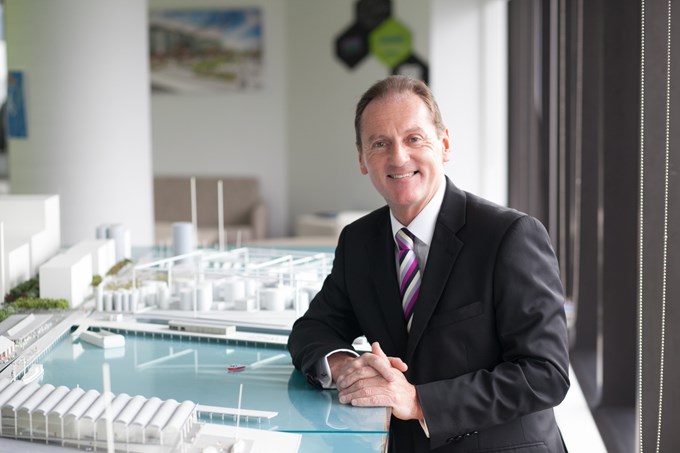Panuku Development Auckland Chief Executive Roger MacDonald reflects on his first three months at the helm of the city’s regeneration agency and the opportunities that lie ahead.
All your children are in the millennial age bracket. How do you think their expectations for city living differ from other generations?
Our dependency on cars is changing, especially among younger people. Each of my four children has sold their car to become more a part of their city’s environment. They work, rest and play within the city – their lives are very focused around that nuclear.
We’re also seeing a paradigm shift in the way retail operates. The traditional patterns in retail, particularly within city centres, are changing. Gone are the days when people would walk out of a shopping centre with 10 bags. Now it can be delivered direct to your door so it’s more convenient, quicker and gives the consumer more time to enjoy their social life.
You’ve spoken previously about your desire to bring ‘heart to the city’. How do you think Wynyard Quarter delivers on that?
Right now Wynyard Quarter is a success story. It’s a fabulous place with the potential to become even better. The challenge is to create more residential product, but the big elephant in the room is how to make it affordable so that young, professional people who want to live and work in the city can financially afford to do so.
Setting aside Wynyard Quarter, which of the other three Transform locations for Panuku (Tāmaki, Onehunga and Manukau) are you most excited about?
In my view, Onehunga is one of the biggest jewels in our crown. It’s a great location with a beautiful backdrop. The opportunity to harness that is a gift. It’s important we connect into the existing high street, which is already a success story, rather than changing the culture of what’s there.
If you were to envisage Auckland 10 years from now, what are your biggest hopes for the city?
To live up to the aspiration of being a truly livable city. There is great potential to bring forward the affordable housing provision in Auckland. The question is how we deliver that product to market more effectively, efficiently and at a better price point.
What do you consider to be the most important factor for successful urban regeneration in Auckland specifically?
Regeneration is complex and a continual programme. It’s a journey. To use the analogy of a train, every time you step off at a station that’s a piece of success. Then you get back on the train and continue. It never really stops. At the same time it’s also about refreshing things throughout the journey by embracing new ideas and initiatives.
Compared to other cities where you’ve lived, how do you view Aucklanders in terms of their willingness and adaptability to change?
There’s a genuine willingness to consider all options here and a real desire to go ahead with change and deliver at pace. Across businesses, corporate entities and the Council there’s appetite to embrace change and to work collectively in order to deliver on this. There’s a sense of ownership and desire to drive it forward.
In Wellington the Chamber of Commerce has welcomed a proposal by the City Council to form an Urban Development agency. What would you say to a community in two minds about the idea?
It will create the potential to deliver, at pace, large mixed-use regeneration projects. In partnership with the private sector, whole regenerations can be successfully delivered with the appropriate infrastructure to support it. The proposed agencies have the potential to use statutory powers to support ‘cradle to grave’ regeneration programmes. The question is whether this will be supported by financed assistance from the Crown to input at speed.
Working within the parameters of a political environment – how is this different for you?
My role has a high political impact and there’s a lot of expectation in terms of delivery. This is an opportunity that I wanted to grab with both hands. What’s really paramount is not only for us to talk about what we do, but also to bring it home - that’s fundamental.


